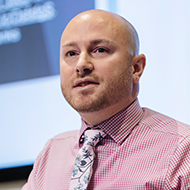VMG calls for more awareness of professional EMS in vet schools

"Today's graduates are emerging into a very different professional environment." - VMG president Richard Casey.
The Veterinary Management Group (VMG) has issued a call for leadership, management and business training to be included in veterinary education.
Responding to the RCVS' consultation on draft accreditation standards for veterinary degree programmes, the VMG believes that these skills should be included in the curricula for both veterinary surgeons and nurses.
Citing changes in the profession, alongside the wide range of career options now open to veterinary professionals as reasons for the requirement of leadership, management and business skills in veterinary education, the VMG recommends the promotion of Professional EMS for gaining these skills.
Professional EMS, where vet students can spend time in industry, management or government, rather than clinical work, is not being offered to students as much as it should, according to the VMG.
The VMG believes that awareness of the availability of this particular form of EMS is too low, and that significantly more emphasis is laid on clinically-based EMS.
VMG president Richard Casey commented on the VMG's call for this type of education: “Today’s graduates are emerging into a very different professional environment, one in which they are highly likely to be influencing and even leading colleagues and clients from day one.
“They also need an understanding of the principles of running a successful veterinary practice.
“We believe that the development of leadership and business skills should be incorporated at the earliest levels of their training and include, for example, discussions of the financial implications of treatment options.
“These skills will prove very helpful for them as they learn to find their place in practice, grow their own client relationships and develop their interests.”
Commenting on the importance of professional EMS as an option, he added: “It’s important to recognise that there are many options for veterinary graduates other than clinical practice and we believe this should be taken into account during their training to enable them to gain a fuller understanding of the paths open to them.
“Undertaking a Professional EMS is one way to do this and the VMG aims to provide opportunities for students to get involved in management projects in areas including practice finance, people management and development, and marketing.”



 FIVP has shared a survey, inviting those working in independent practice to share their views on the CMA's proposed remedies.
FIVP has shared a survey, inviting those working in independent practice to share their views on the CMA's proposed remedies.